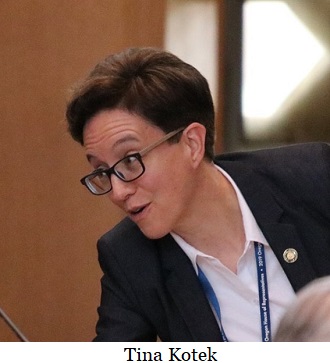Kotek orders OLCC to crackdown
In the wake of the
resignation of Oregon Secretary of State Shemia Fagan, Governor Tina Kotek announced she is directing the Oregon Liquor and Cannabis Com-mission to make state tax compliance a requirement for the agency to issue or renew cannabis retail licenses.
According to a statement by the Governor's office, this will impact approximately 823 licensees -- a disproportionately
high percentage of licensees. Data from DOR shows that cannabis retailers have a higher non-compliance rate in Oregon for payment of taxes (9%) than other tax programs administered by the agency (3%). The OLCC has indicated that there are approximately 823 licensees that would need to obtain the tax compliance certificate in any given year.
At the center of the storm is the embattled cannabis dispensary, La Mota. Owners of the cannabis dispensary chain were major donors to prominent Democrat candidates while at the same time, allegedly facing millions of dollars in tax liens, nonpayment of rent and other bills, and dozens of lawsuits in recent years.
At Governor Kotek’s direction, the OLCC and Oregon Department of Revenue will implement a new mandate requiring applicants for cannabis retail licenses to provide OLCC proof of tax compliance as part of their application process. OLCC has existing statutory authority to make this change and will engage in administrative rulemaking to add this requirement.
Governor Kotek allegedly received over $60,000 from tax-troubled cannabis organizations. And it doesn't end with her. Willamette Week has
reported that Democrat politicians including Senate President Rob Wagner (D-Lake Oswego) received campaign contributions from cannabis retail businesses and their owners in stacks of cash. Large cash contributions make it far more difficult to detect illegal activity because they lack a paper trail.

“I’m grateful to the current leadership at the OLCC and the Department of Revenue for working collaboratively to resolve this long-standing need for equivalent tax compliance across cannabis and liquor sectors,†Governor Kotek said. “This will help ensure that all businesses are operating under the same rules and not getting any competitive advantage if they haven’t paid their taxes.â€
“While it may be technically legal, I don’t think it’s appropriate. It shows a severe lack of judgment to be taking large quantities of cash from owners of a company that is clearly troubled,†said Senate Republican Leader Tim Knopp (R-Bend). “If the last few weeks have shown us anything, it’s that the Democrat Party’s culture of corruption is alive and well. That is why I have drafted LC 4584, a bill limiting cash political contributions to $100. Campaign finance reform has long been a topic of discussion on all sides of the aisle. I have been consistent in my support for reasonable campaign finance limits.â€
A D V E R T I S E M E N T

A D V E R T I S E M E N T
“As wonderful as it is to have piles of cash, it is hard to trace, track or verify. That makes it a troublesome component in a state where there are already no state limits on campaign finance contributions,†said
The Bend Bulletin Editorial Board.
“This is another prime example of why we need a bicameral, bipartisan Joint Committee on Oversight and Accountability. Corruption, wherever it hides, should be rooted out so Oregonians can begin to rebuild trust in their elected leaders,†added Knopp.
Oregon law permits ensuring tax compliance before the issuance of some licenses, contracts, employment, and appointments can be finalized. OLCC will work to add an additional tax compliance tool to its application and renewal process for cannabis retailers by requiring licensees or applicants to provide OLCC with a tax compliance certificate from DOR.
“We want to help people comply with Oregon’s tax laws,†said Betsy Imholt, Oregon Department of Revenue Director, “This is one more opportunity to connect with taxpayers to ensure their taxes are paid. It is good for both Oregon and for the taxpayer.†Several agencies already partner with DOR to confirm that a person is in tax compliance before the issuance of a license, execution of a contract, or appointment to a board or commission.
“Oregon’s cannabis industry is important to the state’s economy, and the sales tax it generates is vital to the state’s budget,†said Craig Prins, OLCC Interim Executive Director. “That’s why it’s critically important for us to get this group of licensees into compliance and paying their fair share.â€
This change at OLCC is the first step to expanding and standardizing tax compliance requirements across state government. In addition to evaluating the need for any statutory or administrative changes, DOR will evaluate ways to embed equity into enforcement and compliance, such as the use of payment plans to be brought into compliance, and through automating the certification process to meet the increased demand for compliance certifications.
--Staff Reports| Post Date: 2023-05-16 21:37:25 | Last Update: 2023-05-17 22:33:42 |







 “I’m grateful to the current leadership at the OLCC and the Department of Revenue for working collaboratively to resolve this long-standing need for equivalent tax compliance across cannabis and liquor sectors,†Governor Kotek said. “This will help ensure that all businesses are operating under the same rules and not getting any competitive advantage if they haven’t paid their taxes.â€
“I’m grateful to the current leadership at the OLCC and the Department of Revenue for working collaboratively to resolve this long-standing need for equivalent tax compliance across cannabis and liquor sectors,†Governor Kotek said. “This will help ensure that all businesses are operating under the same rules and not getting any competitive advantage if they haven’t paid their taxes.â€
